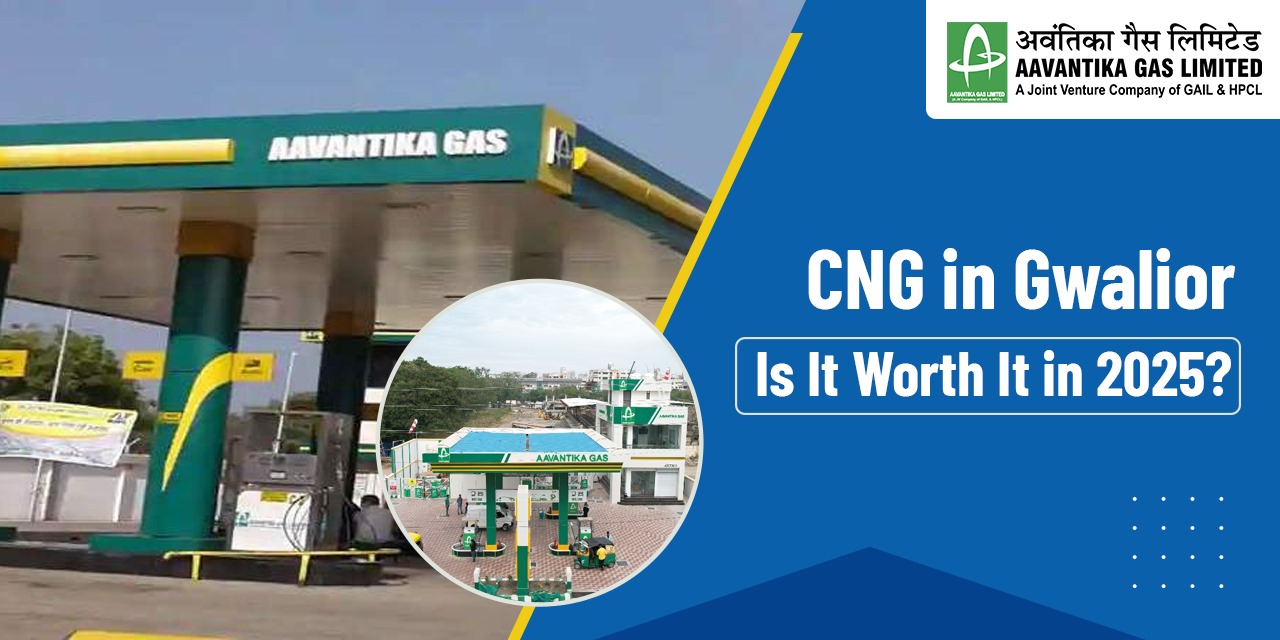Gwalior advances its sustainable energy strategies in its historical and cultural heritage zone. CNG functions as an available substitute for fossil fuels because nations recognise the importance of ecological clean fuels together with economic advantages. The expansion of transportation services, CNG in Gwalior, faces endorsement from public organisations alongside infrastructure enhancements that built up sustainable transportation programs. A 2025 assessment of CNG adoption in Gwalior needs both an accessibility investigation and an analysis of economic and environmental benefits and identification of how Aavantika Gas Limited and other stakeholders influence the outcome.
CNG in Gwalior: A Smart Choice for 2025?
The implementation of CNG in power energy networks happened through planned strategic developments throughout this period in Gwalior. AGL functions as the pioneering step of GAIL (India) Limited and Hindustan Petroleum Corporation Limited toward natural progress. AGL, established on June 7, 2006, delivers continuous safe natural gas delivery to residential, business and industrial customers and automobile sectors across Indore, Pithampur, Ujjain and Gwalior. Continuous CNG delivery programmes through the distribution facility fulfil the escalating needs of private and public transport units.
Economic and Environmental Benefits
The main fuel use of CNG produces multiple economic advantages for users. The expense of CNG remains lower than that of diesel and petrol fuels; therefore, vehicle owners manage to save money. Commercial businesses and municipal transportation networks receive specific advantages from CNG usage for their numerous daily operations in city areas.
Using CNG fuel has environmental advantages because it produces reduced types of pollution, which encompass carbon monoxide alongside nitrogen oxides and particulate matter. CNG-powered conversion contributes to enhanced air quality because it is a part of universal climate change reduction efforts and urban pollution control measures.
Innovative Initiatives in Gwalior
The Bio-CNG plant at Lal Tipara Gaushala functions as its foundational element to become India’s first self-operating cowshed facility. Prime Minister Narendra Modi initiated the 10,000-dairy-cow facility on October 2nd, 2024, through an official start-up ceremony at this bio-CNG-producing facility that daily generates 2 to 3 tonnes of gas. The Gwalior Municipal Corporation generates revenue through its bio-CNG and organic manure business because it provides renewable fossil fuel alternatives to residents.
The programme shows a “Waste to Wealth” operational method which transforms biowaste materials into valuable energy products. The area receives affordable bio-manure, which became available when farmers transitioned to organic farming practices. Gwalior reflects a strong commitment to ecological growth and resource optimisation throughout all city operations.
Challenges and Considerations
Greater market penetration of CNG in Gwalior requires dismantling various obstacles. People avoid acquiring CNG-compatible vehicles and making modifications to vehicles because the payment of high upfront costs acts as a deterrent. The current infrastructure does not meet requirements since CNG users require enough refuelling stations across their service area to maintain operational ease.
Market success for CNG requires dependable continuous operation because its availability depends on this operational stability. The integration of fuel transition with consumer trust needs reliable operation of infrastructure networks. Prolonged technical action needs to develop and preserve continuous distribution operations for CNG.
The Road Ahead
Prospective green initiatives within the sustainable energy sector have made Gwalior a prime location to implement CNG operations. The government must develop important alliances between its sectors and individual businesses and local community organisations to solve current problems. A rapid expansion of the CNG in Gwalior movement requires improvements to infrastructure and education programs that receive financial support from the governing bodies.
Advanced technologies applied to CNG storage systems and distribution networks will enhance their operational safety and their efficiency. Gwalior advances its environmentally sustainable growth plan through sustainable energy programs that result in economic stability.
Conclusion
The year 2025 brings forward a strong opportunity for CNG in Gwalior to implement CNG as a fuel because it matches environmental needs with economic growth. The building of reliable CNG infrastructure by Aavantika Gas Limited enables this transformation process to proceed. The sustainable development initiatives of Gwalior find expression at Lal Tipara Gaushala alongside various innovative projects. Through stakeholder partnerships, Gwalior residents should keep CNG as their sustainable and economically advantageous fuel system to drive environmental advances and economic development toward a better future.
FAQs
Q: How does seasonal waste affect Bio-CNG production?
Bio-CNG production at Lal Tipara Gaushala depends on seasonal variations of agricultural waste, which the site addresses through emergency plans to maintain continuous production during lean seasons.
Q: What are the indirect economic effects of CNG adoption?
The growth of CNG vehicles affects the service requirements for auto repair businesses, which drives the need for skilled technicians who work in different sectors of the job market.
Q: How is CNG infrastructure balanced with historical preservation?
The CNG infrastructure implementation team works with Gwalior’s old architectural structures to establish pipelines in locations that respect the city’s heritage conservation schemes.
Q: How will CNG adapt to rising electric vehicle adoption?
The expansion of both CNG infrastructure networks and bio-CNG programs will require adjustments to survive against Gwalior’s forthcoming increase in electric vehicle market penetration.











No Comments
Sorry, the comment form is closed at this time.